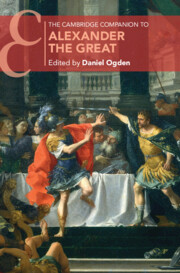Book contents
- The Cambridge Companion to Alexander the Great
- Cambridge Companions to the Ancient World
- The Cambridge Companion to Alexander the Great
- Copyright page
- Dedication
- Contents
- Figures
- Tables
- Maps
- Abbreviations
- Notes on Contributors
- Acknowledgements
- Introduction
- Part I Alexander’s Life and Career
- Part II Contexts
- 9 Macedonia
- 10 Kingship
- 11 Court and Companions
- 12 Changes and Challenges at Alexander’s Court
- 13 The Women of Alexander’s Court
- 14 Religion
- 15 Army and Warfare
- 16 Alexander’s Modern Military Reputation
- 17 Finance and Coinage
- 18 The Administration of Alexander’s Empire
- 19 Geography, Science and Knowledge of the World
- Part III The Historical and Biographical Tradition
- Part IV The Ancient World’s Memory of Alexander
- Alexander’s Timeline 356–321 BC
- References
- Index
- Cambridge Companions to the Ancient World
19 - Geography, Science and Knowledge of the World
from Part II - Contexts
Published online by Cambridge University Press: 04 January 2024
- The Cambridge Companion to Alexander the Great
- Cambridge Companions to the Ancient World
- The Cambridge Companion to Alexander the Great
- Copyright page
- Dedication
- Contents
- Figures
- Tables
- Maps
- Abbreviations
- Notes on Contributors
- Acknowledgements
- Introduction
- Part I Alexander’s Life and Career
- Part II Contexts
- 9 Macedonia
- 10 Kingship
- 11 Court and Companions
- 12 Changes and Challenges at Alexander’s Court
- 13 The Women of Alexander’s Court
- 14 Religion
- 15 Army and Warfare
- 16 Alexander’s Modern Military Reputation
- 17 Finance and Coinage
- 18 The Administration of Alexander’s Empire
- 19 Geography, Science and Knowledge of the World
- Part III The Historical and Biographical Tradition
- Part IV The Ancient World’s Memory of Alexander
- Alexander’s Timeline 356–321 BC
- References
- Index
- Cambridge Companions to the Ancient World
Summary
Although Alexander’s campaign has received less attention than it might from the perspective of geographical studies, the image of Alexander himself as an explorer has, paradoxically, enjoyed great success in the modern historiography. This is partly to be explained by the widespread belief that Aristotle had a great influence on his student. From this perspective, the image of Alexander as an intellectual and a friend of knowledge fits perfectly with that of an explorer eager to know the world. In the eyes of many scholars, an assumption of this sort has allowed Alexander to become more than a mere conqueror. A new way of understanding this problem is proposed here, since we consider that both Alexander the conqueror and Alexander the explorer were essential and indissociable elements of Alexander the king, that is to say, they were indispensable characteristics of any Argead monarch, and these two facets of rulership must be studied together. In other words, knowing the world was one more way to conquer it and rule it.
- Type
- Chapter
- Information
- The Cambridge Companion to Alexander the Great , pp. 317 - 330Publisher: Cambridge University PressPrint publication year: 2024

